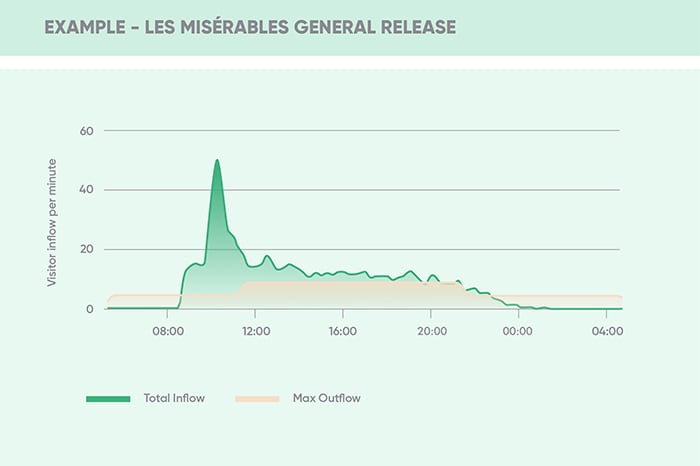Arts and Culture
Theatre
Ecosystem Partners
Ticketing and Admissions
Article
Success Stories
9b305239-e144-4cf4-8277-8cf69fb7601f
8 min
https://edge.sitecorecloud.io/tessituraneab9a-tessiturane5642-staging-5396/media/Images/Licensee-Photography/Photos_768x465/mayflower-theatre-768x465.jpg?h=465&iar=0&w=768
Paul Thompson and Niels Henrik Sodemann share their top tips for managing website traffic
How Mayflower Theatre manages high-demand on-sales
11/17/2021
8 min
With over 4,000 guests, dozens of insightful webinars and success story after success story, the 2021 Tessitura Learning & Community Conference (TLCC) was an inspiring week for an industry that is steadily bouncing back.
For those who missed it, we’ve taken a deep dive into the story of Mayflower Theatre and the strategies they’ve implemented to seamlessly manage high-demand on-sales. Paul Thompson, IT manager at Mayflower Theatre, and Niels Henrik Sodemann, CEO and co-founder of Queue-it, shared their learnings from years working with the ticketing industry and their top tips for managing high-traffic on-sale events.
Mayflower Theatre
Founded in 1928, Southampton’s Mayflower Theatre has a long history of supporting diverse culture and entertainment, hosting everyone from The Beatles to Disney’s The Lion King.

Paul Thompson, Mayflower Theatre
Mayflower Theatre has been growing fast in the past decade. In 2015, the theatre experienced its largest attendance ever. Since then, it’s consistently seen annual attendance exceeding 500,000 — excluding those years impacted by COVID-19 lockdowns.
As Mayflower Theatre grew in popularity, attracting more high-interest theatre favorites such as War Horse, Wicked and The Lion King, their website and booking system began to strain under the pressure. During large on-sale events, the theatre was starting to see frustration and dissatisfaction from their staff, their customers and the partners whose shows they were hosting.
“We knew these issues could occur, and we had put provisions in place to defend against them, but our defences failed,” Paul Thompson said. “We found our saviour from these risks in Queue-it.”
They had no issues getting people excited about their shows but were struggling to manage the demand.
Queue-it
Queue-it’s virtual waiting room service was created specifically to help organizations smoothly handle high-traffic events — so Queue-it’s partnership with Mayflower Theatre was a natural one.

Niels Henrik Sodemann, Queue-it
Virtual waiting rooms work by tracking traffic to a website and redirecting visitors to a waiting room when the website reaches capacity. Visitors are given a place in the waiting room and are filtered back to the website in a controlled first-come, first-served order.
This keeps websites up and running, gives confidence to staff and customers, and facilitates fair and seamless on-sale events.
In 2018, Mayflower Theatre got in touch with Queue-it about their service. As Tessitura TNEW users, the theatre was able to easily integrate Queue-it, and they trialed a virtual waiting room for their on-sale of the Queen musical We Will Rock You.
With more control over traffic, the ability to communicate with customers and the website running at peak performance, the on-sale was a resounding success.
Staff, customers and partners were pleased, and the theatre has worked with Queue-it ever since — through 29 large on-sale events, a global pandemic and over 850,000 tickets sold.
“With the scale of the big shows we’re up against, and with some one-night events also needing protection and coming along at relatively short notice, it made sense for us to take up the annual subscription with Queue-it,” Paul noted. With that setup, the protection runs continually, “with a set of thresholds we know will protect the different levels of the site.” That seamless protection meant that the Mayflower was ready for a surprise: “The big star of a show appeared on weekend breakfast television without warning and suddenly drove thousands of people to the site,” Paul said. “And I did not panic.”
Queue-it handled the volume without a hitch.
Success story: Les Misérables
In 2019, Mayflower Theatre released tickets for the globally popular Les Misérables. They had laid the marketing groundwork and knew that fans would flood their site during the on-sale. Mayflower Theatre had Queue-it in place and were ready.
The chart below offers a peek into how the service works. Once the inflow of customers (the green line) reached the capacity of the website, the virtual waiting room kicked in.

New customers were redirected into a customized waiting room, given a queue number and throttled back into the sale at a manageable pace (the peach line).
At its peak, the queue for Les Misérables tickets reached over 3,700 customers, more than enough to bring down an unprepared website. But throughout the sale, the outflow from waiting room to the theatre’s website was kept at a steady pace, and the on-sale went off without a hitch.
Top nine lessons learned for a successful on-sale
After Paul’s discussion of how Mayflower Theatre implemented Queue-it for traffic management, he teamed with Niels, and the pair shared their learnings from years of successfully running high-demand on-sales.
Here are their nine key takeaways:
1. Have an on-sale checklist
Paul’s team at Mayflower Theatre has a checklist of around 150 points they need to check off for a successful on-sale. This list covers every step of preparation and execution.
Your checklist will need to be catered to your business, team and specific on-sale. Here are a few examples from Paul’s:
- Do we have enough SIP channels on our phone system?
- Do we need extra staff for the on-sale day?
- Have we communicated with partners such as Tessitura and Queue-it?
2. Start early
The earlier you start preparing, the less stress you’ll have leading up to the on-sale. The first point on Mayflower Theatre’s checklist gets ticked off about two weeks before their on-sale even starts. All key stakeholders are included in preparations from early on, ensuring as few last-minute changes as possible. Give yourselves plenty of time to consider all the little details that can get forgotten in the chaos.
The earlier you start preparing, the less stress you’ll have.
3. All hands on deck
Customer service teams, the IT team, extra support staff — everyone you need or could need for your on-sale should be prepared and available on the big day. All staff should know their roles and be ready at all times to jump into action.
Paul suggests either having a ‘war room’, where all staff gather and closely monitor the on-sale or, if you don’t have the space or if your staff work remotely, an instant chat tool can help you distribute key information quickly.
4. Communication is key
When you have thousands of people trying to get tickets, dozens of staff members monitoring the sale and several partners you’re collaborating with for an on-sale, communication needs to take center stage.
Ensure you have one or more direct lines of communication with your customers. This could be through a mailing list, social media or the real-time communication pane in Queue-it’s waiting room.
Tap into queue psychology by showing customers as much information as possible. The more people know about the current situation, the more patient they’ll be and the fewer complaints they’ll have. Be transparent with your customers to manage expectations.
The same goes for third-party stakeholders: Establish communication and be transparent. Notify the organizations you’re working with about your on-sale early, and don’t hesitate to contact your service providers or ticketing partners if issues arise. If you’re working with Tessitura and/or Queue-it, support is just a phone call away.
Establish communication and be transparent.
5. Understand your system capacity and bottlenecks
Before you launch a high-interest on-sale, it’s crucial to understand your system bottlenecks and capacity. You’ll probably have some idea of how many people are going to visit your site on the big day, but if you don’t know what your website can handle, it won’t make a difference.
This means you need to understand not just your capacity but also the capacity of any third-party systems you have in place. Both Tessitura and Queue-it can help you better understand these factors and how to act on the information.
6. Prepare for early visitors
Once you’ve told customers what time tickets go on sale, many will rush to your website early in the hopes of being first in line or snagging an early ticket. This can lead to your website crashing before your on-sale even begins.
If you are implementing a traffic management system, ensure that it’s set for between 90 and 120 minutes before a sale goes live. This pre-queue acts as a virtual lobby for your visitors with a countdown timer for your sale.
It can also offer another opportunity to communicate to your customers. You might try a message like: ‘Thank you for your interest in our event! Tickets go live at 10AM, at which point we’ll give you a randomized queue number. You’ll be directed to our website for purchase when it’s your turn.’
7. Be on the safe side
Both Paul and Niels recommended erring on the side of safety on your big day. Mayflower Theatre typically keeps their threshold for traffic outflow lower than it needs to be to ensure that nothing goes wrong during an on-sale.
Most customers will get onto your site, immediately purchase their tickets and leave. But some may stick around longer than expected or encounter transaction issues. Keeping your outflow low allows room for surprises.
Be sure to monitor not just the capacity of the site but also the available inventory. If you have five tickets left and you let 20 customers visit the transaction page at once, they’re going to end up frustrated and confused. So remember: Slow and steady wins the race.
Allow room for surprises.
8. Prepare for resellers and bots
While the live entertainment business has been in hibernation during the pandemic, bot developers have not. At Queue-it we’ve seen bots trawling everything from sneaker sales to vaccine rollouts in the past year.
If you have a high-interest event and your tickets have high resale value, you need to be prepared for resellers and ticket bots trying to snatch tickets out of your real customers’ hands.
Consider the potential for bots and reselling by asking:
- Is the on-sale restricted or open?
- Is there likely to be a resale market?
- Is resale illegal in your region? If so, are the laws enforced?
If there’s potential for bots and resellers, decide how you want to handle them and mitigate their impact on your on-sale. There’s no silver bullet for bot mitigation, but many services out there can help. A virtual waiting room is a powerful tool in your bot and abuse mitigation toolkit. By slowing down traffic, it gives you more room to detect and remove bots and resellers from your on-sale event.
9. Let them down gently
In an ideal world, everyone who wants to attend an event would be able to. But the reality is that you only have so many tickets available. In many cases, some customers lose out.
Niels’ tip is to turn this pain point into an opportunity to engage fans. Once tickets have sold out, you can direct those who missed out to a special mailing list in case you add additional shows, give them the opportunity for early access tickets for a future show or display alternative shows that still have tickets available.
The goal here is to show customers you care. Even though they may have missed out on tickets this time, show that you value their interest and are eager for them to attend future events.
Show customers you care.
Expect the unexpected
Paul’s and Niels’ advice can be summed up in three words: Expect the unexpected. This means having everything planned out, communication channels established, more staff than you need and steps in place to manage high demand.
Want to learn more about successful ticket on-sales?
Get Queue-it’s free guide with eight proven tips validated by 10+ years of experience with the world’s largest ticketing organizations.
Read Tessitura’s tips to help you plan for successful on-sales.
Topics
Arts & Culture
/Theatre
/Ecosystem Partners
/Ticketing & Admissions